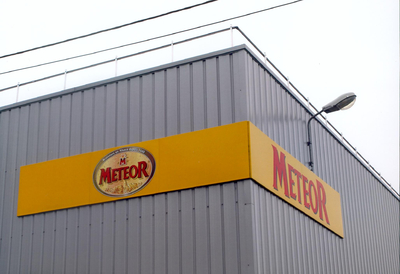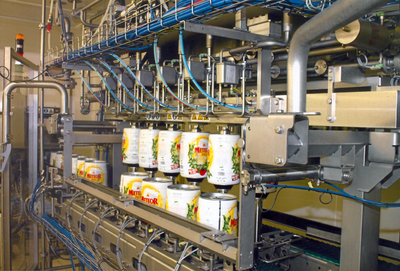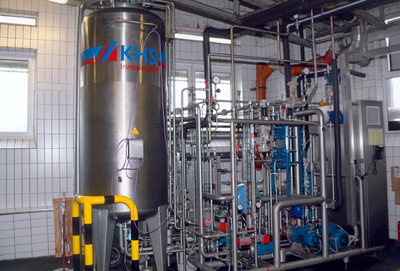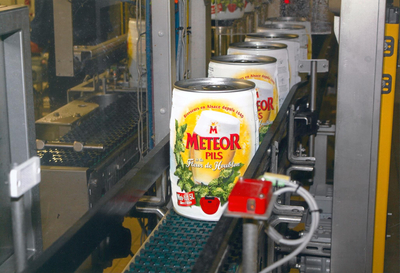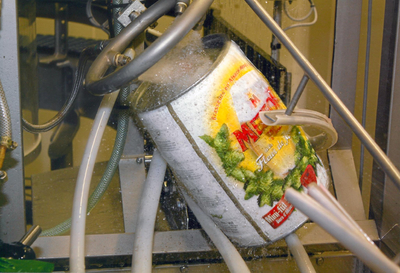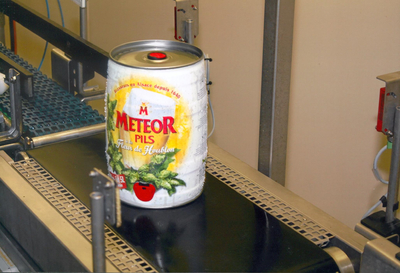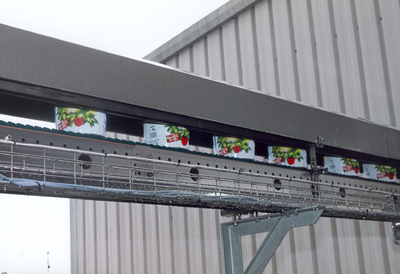
France's Biggest Family-owned Brewery
Meteor Brewery relies on the trend towards the 5-liter can and KHS system technology
Achim Schlicher*
Whether you're having a barbecue, watching soccer on the TV, or have just been for a run, for many, this just wouldn't be the same without a beer or two! For groups engaged in such pastimes, beer sold in containers that are sizeable but not too large is extremely practical. In recent years the handy 5-liter beer can has thus become more and more popular worldwide – with the trend likely to continue. In addition to classic 5-liter cans designed for speedy consumption once opened, the market is seeing an increase in the number of 5-liter containers where a CO2 cartridge is activated when the beer is first tapped. This means that as soon as the cartridge is activated, a positive pressure of CO2 is created within the container so that the beer isn't exposed to oxygen. This enables the beer to retain its perfect quality over a period of around 30 days – despite it having been tapped. It thus seems logical that this new-found popularity of the 5-liter can has prompted the brewing industry to invest in it on a larger scale. The majority of breweries thus focus on the 5-liter can system which not only perfectly fills and processes various classic containers of this size but also several different 5-liter beer 'barrels' equipped with a CO2 cartridge. One such company is the Brasserie Alsacienne Indépendante Meteor in France who recently invested in a flexible KHS turnkey line to replace a semi-automatic setup that produced about 170 5-liter cans an hour. Using the same number of filling heads, the new KHS line currently has a capacity of 600 5-liter cans an hour, with the system output extendable to 700 5-liter containers per hour. Bernhard Oster, engineering manager at the Meteor brewery, says, "We are extremely pleased with our new investment. Firstly, it gives us the flexibility we require to process the various types of 5-liter can we have, and, secondly, the reliability we need. The line operates with an efficiency that has even exceeded our expectations. It was 98% during the acceptance test; in operation the level of efficiency is similarly outstanding."
* Project Management, KHS GmbH, Kriftel. Phone: +49 (6192) 491-122
Traditional success
Brasserie Meteor in Alsace, France, is a brewery with a long tradition. It first started brewing beer in 1640. Since the Haag family acquired it in 1844, the company has been 100% family owned. Family ownership is now in the seventh generation. The brewery was named Brasserie Meteor in 1925, its nomenclature possibly based on the idea of a meteorite whizzing through space. Whether this be true or not, the brewery has certainly proved meteoric by both name and nature, its sales of beer being a striking success down the decades and particularly since the 1950s.
Sales of over 500,000 hectoliters
In 1956, the brewery hit the 100,000-hectoliter sales mark and doubled this figure by 1966. Sales reached 300,000 hectoliters in 1982, 400,000 hectoliters in 1990, and 500,000 hectoliters in 2007. The best-ever result was achieved in 2009 with 535,000 hectoliters of beer sold, amounting to a turnover of 47 million euros.
Number one among the family-run breweries of France
If we take the current sales figures, Brasserie Meteor occupies sixth place in the top ten breweries of France, and is number four in the Alsace region. In the ranking of France's family-owned breweries, however, the enterprise is the clear number one.
Also an active exporter
Around 50% of Meteor's total sales are destined for its homeland of Alsace, with 40% distributed throughout other regions of France. The remaining 10% are sold abroad, the main countries of export being England, Italy, and Switzerland.
Extensive range of beers
Meteor has developed its range of beers along the lines of something for everyone. There are the classic varieties, such as pilsner, lager, Pure, malt, wheat beer, non-alcoholic beer, and shandy, spring and Christmas styles, and also the Muse brand, a beer specially developed for young adults and women which, according to Oster, has a slightly sweeter taste. The big hits are – and always have been – pilsner and lager, with each one chalking up 20% of overall sales.
Strong presence in the hospitality and retail trade
Brasserie Meteor is active in both the hospitality and retail trades. Whereas its core sales area focuses on retail, on a national scale the catering industry is at the hub of its activities. Oster comments, "The popularity of a brand of beer can be especially boosted through activity in the bar and restaurant trade." The Meteor brewery provides a comprehensive range of services to both the hospitality and retail sectors. In the catering sector, providing support with investments, consultancy, and the service and maintenance of tapping systems are particularly important, with point-of-sale campaigns promoting Meteor brand beers of the utmost significance to the retail trade. Retailers are also interested in the fact that Meteor is active on the generic products market, providing customers with house brands should they require it.
Many different container types
Brewer Meteor makes use of many different types of container. The most frequently sold glass bottle is the disposable 0.25-liter size. Meteor also fills beer into one-way glass 0.33-liter and 0.65-liter bottles, plus the returnable 0.75-liter bottle specific to the Alsatian market. The company also racks classic 20, 30, and 50-liter kegs, plus the disposable KeyKeg. The only cans filled are those that hold 5 liters.
Five-liter can since the early 1980s
The Meteor brewery began filling 5-liter cans at the beginning of the 1980s, the first and only brewery in France to do so. It started out with very small amounts of a few hundred hectoliters a year. The popularity of the 5-liter can among consumers has continued to grow to this very day, with the brewery selling 30,000 hectoliters of beer in the 5-liter can alone in 2009. "We are reckoning with further growth rates in this area," claims Oster. "We are well equipped with our new KHS line and also have enough free capacity to undertake contract filling for other breweries. This is feasible because another filling station can be added to the filling system; also, by extending production time to cover two shifts, we can make up the larger volume of cans we estimate we'll be needing in the coming years."
Trust and a good overall concept: the perfect combination
Meteor opted for a 5-liter canning line from KHS, to quote Oster, "because the overall concept was right". The company had also placed great trust in KHS technology for some time, with both glass bottling lines at the brewery based on KHS engineering and also a KHS keg line in operation. "The KHS filling systems and KHS keg line may be getting a bit old now," Oster comments, "but all machines work extremely reliably. And when we required service of one kind or another, we were always very satisfied with KHS' performance, this being another major decisive factor for us."
Meteor pilsner and Meteor Christmas beer in the 5-liter can
At present, the canning line is being used to fill not just Meteor pilsner but also its special Christmas beer. Meteor also fills for other interested breweries that don't have the filling capacity for the 5-liter can.
Enclosed system area for perfect hygiene
Empty cans are delivered to Brasserie Meteor on pallets. These empties are depalletized by hand – and manually reloaded onto pallets after filling. Once on the conveyor, the empty cans travel through an opening in the wall into the enclosed system area. The reason for sealing off the line from external influences is to provide maximum safety of hygiene. This hygienic security is further aided by the positive pressure constantly maintained within the system area.
Can marking followed by dust cap removal
After entering the line, the bottoms of the cans are marked with filling data. They then pass through a dust cap remover that both disposes of the caps and initially purges the cans with CO2. Just before they enter the system, a laser checks for any caps still attached. Downstream of the dust cap remover the cans are inspected to check that all caps have been reliably removed.
Long-tube Innokeg Multibloc F filling system with six active filling stations
The cans travel to the long-tube Innokeg Multibloc F filling system along a short buffer section, the system having six filling stations plus an empty station that can be configured should an increase in capacity be planned. The filling system is of an open design and thus easy to clean and maintain.
Independently operating filling elements
On entering the filling system the cans are positioned under the filling elements by a pusher rake. Lifting elements that operate independently of one another move the cans to the filling heads that are also autonomous in their operation.
Gentle filling process with low oxygen pickup and minimal CO2 loss
During lifting the can is purged with CO2, and as soon as it is pressed against a filling element, it is pressurized with the same type of gas. This pressurization process is continued until the pressures both in the inside of the can and the product tank are equal. Only then does the pressurization gas cylinder close and the product valve open. The filling process starts with a slow fill that continues until the filling tube has been wetted with beer. This is followed by a fast fill phase which is supported by opening the cylinder of the return gas channel to thus discharge more pressurization gas. The cylinder closes towards the end of the filling process. The slow final filling phase then begins and ends only when the can contains the given volume of liquid measured by electromagnetic inductive flowmetering. When the product valve closes, the return gas cylinder opens to enable any residual pressurization gas to disperse out of the can in a controlled process.
The bottom-up filling method with a long filling tube employed by the Innokeg Multibloc F facilitates a gentle filling process with minimum oxygen pickup in the product and an extremely low loss of CO2. Filling by means of electromagnetic inductive flowmetering also ensures exact fill levels. Overfilling is not necessary; product is thus saved. Another advantage of the Innokeg Multibloc F is that the filling stations can be deactivated individually. If, for example, one filling station should fail for some reason, the machine can continue to process with the other filling stations. This advantage also proves useful if a lower filling capacity should be scheduled at any time, with filling heads being excluded from or added to the filling process as and when required. CIPing the Innokeg Multibloc F entails simply pushing CIP sleeves over the filling tubes and bayoneting them to the valve block.
KHS Innopro KZE flash pasteurizer for excellent beer quality
One integral part of the system concept is the KHS Innopro KZE flash pasteurizer which through its highly accurate temperature flow control (PU) and positive pressure gradient is responsible for the excellent quality of the beer to be pasteurized. The automated adaptation of the output by means of an integrated buffer tank ensures that the pasteurized product is supplied continuously, consistently, and lastingly to the entire line.
Flexible stopper applicator
After filling, the cans are transported to the stopper applicator. As the beer is foamed after filling, no oxygen is allowed to enter the filled can as it travels from the filler to the stopper applicator. Stoppers are applied fully automatically. In what's known as the stopper hopper, stoppers are applied individually to each can by a vibrating head and vibrating rail. The stopper hopper can process various types of stopper and also quickly and simply adapts to new situations and conditions.
Reliable removal of beer residue
To reliably remove any beer residue from the cans produced when the beer is foamed, the upper area of the can is sprayed with water. The cans are then mechanically turned by 90°and blown dry with air. Full can scales check that the cans have been filled properly. Any cans not containing the pre-specified filling volume are rejected. 'Good' cans that pass inspection exit the enclosed area through an opening in the wall and travel towards the palletizing section which is housed in a separate building, where cans are palletized by hand.
Meteor's special conveyor system
At the Meteor brewery cans are sent to be palletized across an outside area. To ensure that they are conveyed especially gently along the outside wall of the building, KHS has developed special wall consoles that specifically level out any unevenness during travel. KHS has also constructed a specially customized covering for the conveyors that reliably protects the 5-liter cans whatever the weather.
A real boon
"Our new KHS big canning line is a real boon to the company," enthuses Bernhard Oster. "With it we can rest assured that our cans are filled to perfection. It's also extremely flexible and allows us to process all types of 5-liter cans currently on the market. It's also of great importance to us that despite the higher output we now have as opposed to the older systems, we need less operating personnel for the new line."
Top quality and always up to date – now and in the future
As already mentioned, Oster reckons on the 5-liter can continuing to boom. As far as the development of the brewery is concerned, the prime concern is to uphold the high quality of the beer produced by this family enterprise. Quality, flexibility, and creativity are and will remain the guiding principles of the brasserie. The sales plan for 2010 is set at 530,000 hectoliters, a figure that will once again cement the position Meteor holds on the French market. One feasible activity for the future is not just to expand the presence of quality Meteor beer in the region but also to penetrate other areas of France and build up export sales as well. Oster muses, "Developing new brands of beer is also easily feasible with the flexible structures we now have. Whatever the case, we will always be up to date – both now and in the future. And will continue to provide top quality at all levels. After all, this goes without saying …"

